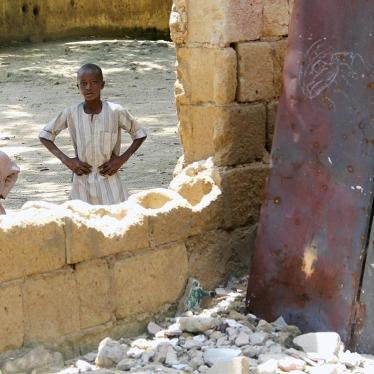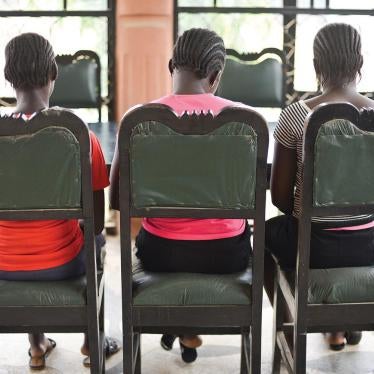(Abuja) – The campaign of violence by the militant Islamist group Boko Haram, including attacks on churches and suicide bombings in the first three weeks of 2012 that killed more than 253 people, is an indefensible attack on human life, Human Rights Watch said today. The January 20, 2012 attacks in the northern city of Kano left at least 185 police and residents dead and resulted in the highest death toll in a single day since Boko Haram began its violent campaign in July 2009. More than 935 people have been killed in some 164 suspected attacks by the group during this period, Human Rights Watch said.
The group has claimed responsibility for bombing churches, police stations, military facilities, banks, and beer parlors, in northern Nigeria, as well as the United Nations building and police headquarters in Abuja, the nation’s capital. Suspected Boko Haram members, often riding motorcycles and carrying Kalashnikov rifles under their robes, have gunned down numerous Christian worshipers, police officers, and soldiers, and assassinated local politicians, community leaders, and Islamic clerics who oppose the group.
“Boko Haram’s attacks show a complete and utter disregard for human life,” said Corinne Dufka, senior West Africa researcher at Human Rights Watch. “The Nigerian authorities need to call a halt to this campaign of terror and bring to justice those responsible for planning and carrying out these reprehensible crimes.”
The group Jama’atu Ahlis Sunna Lidda’awati wal-Jihad, commonly known as Boko Haram, has carried out increasingly deadly attacks, including suicide bombings, which killed at least 550 people in 115 separate attacks in 2011. In the first three weeks of January 2012 alone, more than 253 people have been killed in 21 separate attacks.
Human Rights Watch has tracked media reports of attacks by suspected Boko Haram members over the past two years. The vast majority of these incidents have taken place in Maiduguri, the capital of Borno State in northeastern Nigeria, where the group had its headquarters, but attacks by suspected members of the group have also been carried out in Abuja and at least 10 other states in northern Nigeria.
Many of the attacks in the past month have specifically targeted Christians and southern Nigerians living in the north, including the Christmas Day 2011 bombing of a Catholic church in Madalla, Niger State, which killed at least 40 people.
In response to the escalating attacks, President Goodluck Jonathan declared a state of emergency on December 31, in parts of Borno, Niger, Plateau, and Yobe states. Boko Haram responded on January 2 with a three-day ultimatum to southern Nigerians, most of whom are Christian, to leave the North.
Three days later, on January 5, suspected members of the group attacked a church in Gombe State, killing six people, including the pastor’s wife. On January 6, Boko Haram gunned down 12 members of the Igbo ethnic group, from southeastern Nigeria, during a community meeting in Mubi, Adamawa State, and attacked a church in Yola, the state capital, killing 12 Christian worshipers. At a filling station in Potiskum, Yobe State, on January 11, suspected members of the group opened fire on a commuter van full of Igbo passengers leaving the north, killing four of the passengers.
Boko Haram’s leader, Abubakar Shekau, in a video released on January 11, claimed that the group carried out the attacks on Christians in retaliation for the killing of Muslims by Christians in central Nigeria, including Kaduna and Plateau states.
“Boko Haram is targeting and killing people in northern Nigeria based on their religion and ethnicity,” Dufka said. “The Nigerian government has an obligation under international law to protect its citizens. The authorities need to step up security, with additional police and regular patrols in communities at risk.”
The Nigerian police, on January 14, announced the arrest of a suspect in the Christmas Day church bombing in Madalla, but he escaped from police custody the following day. Several other Boko Haram suspects have escaped from custody in the past months in suspicious circumstances.
Boko Haram expanded its methods of attack in 2011 to include the use of suicide bombers, including the August 26 attack on the UN building in Abuja, which killed 25 people and injured more than 100 others. The group carried out a series of similarly coordinated attacks on police stations, banks, and churches in Yobe and Borno states on November 4. The attacks left more than 100 people dead.
The January 20 attacks, including apparent suicide car bombings, targeted the state and regional police headquarters, three local police stations, and a police barracks in Kano, the largest city in Nigeria’s north, as well as the offices of the State Security Service and the immigration department. Armed men gunned down police officers and shot wildly at random passers-by, then engaged the police and soldiers in running gun battles. According to a police statement and media reports, the dead included numerous Kano residents, one Indian, two Nepalese nationals, a journalist working for Channels TV (an independent Nigerian television station), twenty-nine police officers, three customs and immigration officers, and three State Security Service agents.
Boko Haram seeks to impose a stricter form of Sharia or Islamic law in northern Nigeria and end corruption. News media reported that a spokesperson for the group, Abul Qaqa, took responsibility for the attacks in Kano, saying the group carried out the attacks because the government refused to release Boko Haram members who had been arrested.
Violence by Boko Haram, which means “Western education is a sin” in the Hausa language of northern Nigeria, can be traced to five days of clashes in July 2009 between the group and members of the security forces in Borno, Yobe, Bauchi, and Kano states that left more than 800 people dead, including at least 30 police officers. The police summarily executed the captured Boko Haram leader, Mohammed Yusuf, along with several dozen of his followers in front of the police headquarters in Maiduguri. Boko Haram has said that its attacks on the police are in revenge for these killings.






